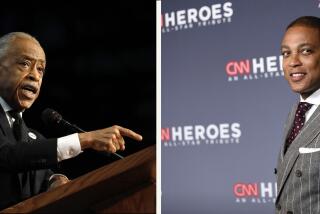Sharpton says he’s a cat, not a rat, for helping FBI chase mobsters
NEW YORK — The Rev. Al Sharpton, the long-time political agitator and TV personality famous for his willingness to take on law enforcement and the establishment, admitted Tuesday he had worked with the FBI years ago but insisted he was not a “rat.”
“I was not and am not a rat,” said Sharpton, who held a news conference at the headquarters of his National Action Network to respond to a report Monday on the Smoking Gun. “I’m a cat,” he added. “I chase rats.”
The Smoking Gun said Sharpton was known to the FBI as CI-7, or confidential informant 7, and informed on mob figures in New York for several years, starting in the mid-1980s.
Documents posted on The Smoking Gun included FBI affidavits detailing some of CI-7’s actions, including secretly recording conversations with mobsters that revealed organized crime’s involvement in the recording industry.
“This information has never been found to be false or inaccurate,” one FBI agent wrote of CI-7’s cooperation.
At the news conference, Sharpton defended his work with the FBI at the time, because he said it was targeting mob figures who were trying to put a stranglehold on legitimate business people.
“I did what was right,” said Sharpton, rejecting the idea that this compromised his image as a civil rights activist and frequent critic of law enforcement activities. In this case, Sharpton said, he was helping law enforcement go after organized-crime figures who were a threat to him and to people he knew.
Sharpton appears far less controversial than he was in the 1980s, when he gained fame for playing a high-profile role in the case of 15-year-old Tawana Brawley.
In 1987, Brawley, an African American, was found disheveled and covered in feces and burns, saying she had been raped by six white men, including some police officers. A grand jury concluded Brawley had made up the story; Sharpton, one of Brawley’s most vocal defenders, accused prosecutors of racism.
In a conversation with the Los Angeles Times two years ago, Sharpton denied he had changed. Rather, he said, the country had changed. “And I think that in the context of the country changing, what was considered extreme 30 years ago is more central now,” he said.
Sharpton proved a calming voice in the aftermath of the Trayvon Martin killing, joining with the Florida teenager’s parents in calling for peaceful protests as they demanded that police arrest the shooter, George Zimmerman.
He has his own radio show, hosts “PoliticsNation” on MSNBC and has spoken out on other police shootings, frequently appearing alongside families to demand investigations.
So Sharpton’s association with the FBI, which maintained secret files on political activists during the civil rights era, was not something Sharpton was likely eager to have splashed across the media.
“Sharpton’s secret mole role,” the New York Daily News’ headline read Tuesday. “Rev Rat,” the New York Post blared on its front page.
Sharpton, 59, said he had not been paid for helping the FBI and that he had no regrets, except for the photographs that emerged with the Smoking Gun report.
They show Sharpton in the 1980s looking many pounds heavier than he is today.
More to Read
Sign up for Essential California
The most important California stories and recommendations in your inbox every morning.
You may occasionally receive promotional content from the Los Angeles Times.











